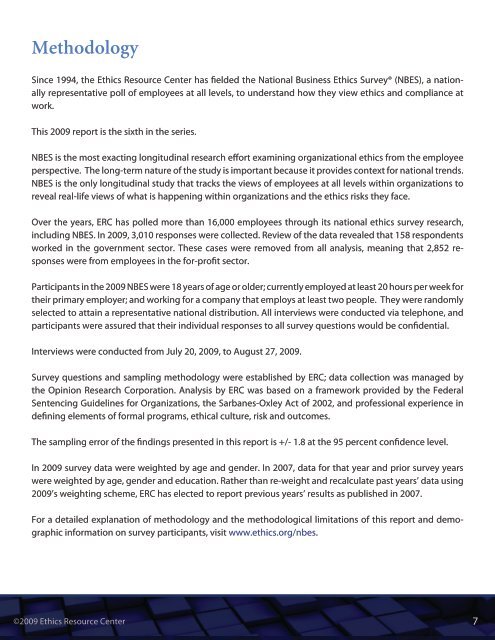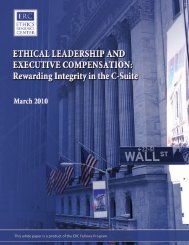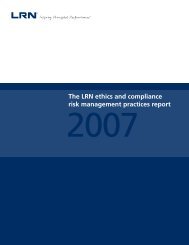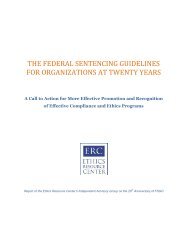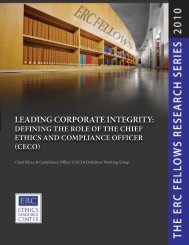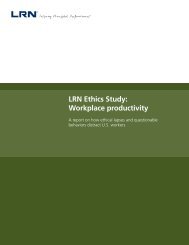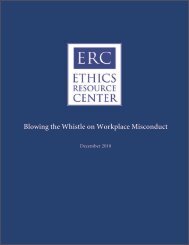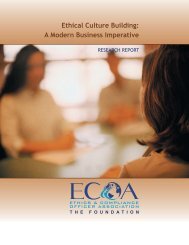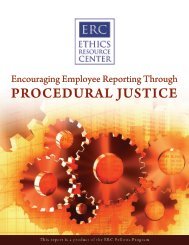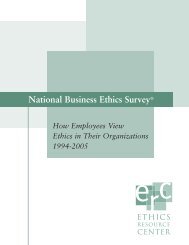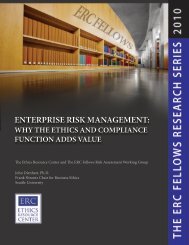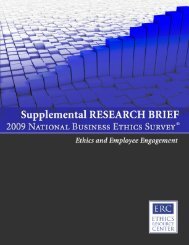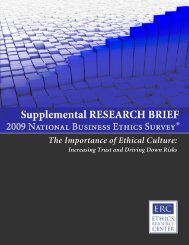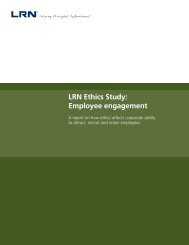The 2009 National Business Ethics Survey - Ethics Resource Center
The 2009 National Business Ethics Survey - Ethics Resource Center
The 2009 National Business Ethics Survey - Ethics Resource Center
- No tags were found...
You also want an ePaper? Increase the reach of your titles
YUMPU automatically turns print PDFs into web optimized ePapers that Google loves.
MethodologySince 1994, the <strong>Ethics</strong> <strong>Resource</strong> <strong>Center</strong> has fielded the <strong>National</strong> <strong>Business</strong> <strong>Ethics</strong> <strong>Survey</strong>® (NBES), a nationallyrepresentative poll of employees at all levels, to understand how they view ethics and compliance atwork.This <strong>2009</strong> report is the sixth in the series.NBES is the most exacting longitudinal research effort examining organizational ethics from the employeeperspective. <strong>The</strong> long-term nature of the study is important because it provides context for national trends.NBES is the only longitudinal study that tracks the views of employees at all levels within organizations toreveal real-life views of what is happening within organizations and the ethics risks they face.Over the years, ERC has polled more than 16,000 employees through its national ethics survey research,including NBES. In <strong>2009</strong>, 3,010 responses were collected. Review of the data revealed that 158 respondentsworked in the government sector. <strong>The</strong>se cases were removed from all analysis, meaning that 2,852 responseswere from employees in the for-profit sector.Participants in the <strong>2009</strong> NBES were 18 years of age or older; currently employed at least 20 hours per week fortheir primary employer; and working for a company that employs at least two people. <strong>The</strong>y were randomlyselected to attain a representative national distribution. All interviews were conducted via telephone, andparticipants were assured that their individual responses to all survey questions would be confidential.Interviews were conducted from July 20, <strong>2009</strong>, to August 27, <strong>2009</strong>.<strong>Survey</strong> questions and sampling methodology were established by ERC; data collection was managed bythe Opinion Research Corporation. Analysis by ERC was based on a framework provided by the FederalSentencing Guidelines for Organizations, the Sarbanes-Oxley Act of 2002, and professional experience indefining elements of formal programs, ethical culture, risk and outcomes.<strong>The</strong> sampling error of the findings presented in this report is +/- 1.8 at the 95 percent confidence level.In <strong>2009</strong> survey data were weighted by age and gender. In 2007, data for that year and prior survey yearswere weighted by age, gender and education. Rather than re-weight and recalculate past years’ data using<strong>2009</strong>’s weighting scheme, ERC has elected to report previous years’ results as published in 2007.For a detailed explanation of methodology and the methodological limitations of this report and demographicinformation on survey participants, visit www.ethics.org/nbes.©<strong>2009</strong> <strong>Ethics</strong> <strong>Resource</strong> <strong>Center</strong> 7


